Canadian Newsmaker of the Year
The Canadian Newsmaker of the Year is a title awarded by the Canadian Press (CP) annually since 1946, reflecting the opinion of CP, and, since its formation in 1954, that of Broadcast News, on which Canadian has had the most influence on the news in a given year.[1] Canadian historian Chad Gaffield stated that the practice of recognising a newsmaker of the year was a return to the study of how history can be influenced by one person, rather than studying obscure people.[1]
The honour is often granted to politicians,[2] sometimes upwards of 10 times,[N 1] and though it is generally a positive acknowledgement, it is not guaranteed to be such.[4] In 1999 a newsmaker of the century was chosen in place of a newsmaker of the year,[1] with candidates having to meet the standard of "lasting significance". Voters gave a mix of compliments and criticisms to the winner, Pierre Trudeau, who responded by noting that he was "at once surprised and quite pleased with the information."[5]
List of Newsmakers of the Year
| Year | Awardee | Notes |
|---|---|---|
| 1946 | Igor Gouzenko | Embassy clerk who exposed Soviet espionage. |
| 1947 | Barbara Ann Scott | First North American to win World Figure Skating Championship |
| 1948 | William Lyon Mackenzie King | Retired that year as the longest serving prime minister in Commonwealth of Nations history. |
| 1949 | Louis St. Laurent | Politician who was appointed prime minister after his party won that year's federal election. |
| 1950 | Lester Pearson | Diplomat. |
| 1951 | Lester Pearson | |
| 1952 | Lester Pearson | |
| 1953 | Lester Pearson | |
| 1954 | Marilyn Bell | Marathon swimmer. |
| 1955 | Lester Pearson | |
| 1956 | Lester Pearson | |
| 1957 | John Diefenbaker | Appointed as prime minister after his party won an unexpected minority in that year's federal election. |
| 1958 | John Diefenbaker | Continued as prime minister after his party won the largest majority in Canadian history in that year's federal election. |
| 1959 | John Diefenbaker and Joey Smallwood | Prime minister and premier of Newfoundland, respectively. |
| 1960 | John Diefenbaker | |
| 1961 | James Coyne | Resigned that year as Governor of the Bank of Canada. |
| 1962 | Réal Caouette | Social Credit politician who helped vote out the Diefenbaker government. |
| 1963 | Lester Pearson | Was appointed as prime minister after his party won that year's federal election. |
| 1964 | Lester Pearson | Oversaw as prime minister the debate on Canada's flag. |
| 1965 | Lucien Rivard | Convicted drug smuggler who escaped from prison and remained at large for 136 days. |
| 1966 | John Diefenbaker | Refused to surrender Progressive Conservative Party leadership. |
| 1967 | Lester Pearson | Oversaw as prime minister the organisation of the festivities for the Canadian Centennial. |
| 1968 | Pierre Trudeau | Appointed as prime minister after his party won that year's federal election. |
| 1969 | Pierre Trudeau | |
| 1970 | Pierre Trudeau | |
| 1971 | Pierre Trudeau | |
| 1972 | Pierre Trudeau | |
| 1973 | Pierre Trudeau | |
| 1974 | Pierre Trudeau | |
| 1975 | Pierre Trudeau | |
| 1976 | René Lévesque | Appointed as the first sovereigntist premier of Quebec after his party won that year's provincial election. |
| 1977 | René Lévesque | |
| 1978 | Pierre Trudeau | |
| 1979 | Joe Clark | Appointed as prime minister after his party won that year's federal election. |
| 1980 | Terry Fox | With an artificial leg, averaged 42 km per day during his Marathon of Hope. |
| 1981 | Terry Fox | Died at age 22. |
| 1982 | Wayne Gretzky | Hockey player nicknamed The Great One, scored a record 92 goals in a single season. |
| 1983 | Brian Mulroney | Won the leadership election to head the Progressive Conservative Party. |
| 1984 | Brian Mulroney | Appointed as prime minister after his party won a record 211 of 282 seats in that year's federal election. |
| 1985 | Steve Fonyo | Cancer victim who lost a leg and ran a marathon similar to Terry Fox's. |
| 1986 | Rick Hansen | World-class cross-country wheelchair athlete. |
| 1987 | Rick Hansen | |
| 1988 | Ben Johnson | Set a world record in the 100 meter race at the 1988 Summer Olympics, but was subsequently disqualified for steroid use. |
| 1989 | Michael Wilson | Minister of Finance responsible for the Canada-US Free Trade Agreement. |
| 1990 | Elijah Harper | Member of the Legislative Assembly of Manitoba who filibustered to stop the Meech Lake Accord. |
| 1991 | Brian Mulroney | Advised the implementation of the Goods and Services Tax and dealt with the aftermath of the failure of the Meech Lake Accord. |
| 1992 | The referendum on the Charlottetown Accord | The first selection of a symbol rather than a specific person. |
| 1993 | Kim Campbell | Briefly served as prime minister, becoming the first woman to do so in Canada. |
| 1994 | Jacques Parizeau | Appointed as premier of Quebec after his party won that year's provincial election |
| 1995 | Lucien Bouchard | Leader of Her Majesty's Loyal Opposition in the federal parliament, and a key player in the referendum on Quebec sovereignty. |
| 1996 | Donovan Bailey | Sprinter who ran 100 meter dash in record 9.84 seconds, winning gold at that year's olympics. |
| 1997 | Sheldon Kennedy | Child abuse victim who went public in his campaign against abuse. |
| 1998 | Jean Chrétien | Prime minister who was chosen over the National Post's publisher, Conrad Black, by one vote, for favourable public opinion. Chrétien merely replied that a prime minister is often a newsmaker.[6] |
| 1999 | Pierre Trudeau | Voted Canadian newsmaker of the 20th century, with no newsmaker named for 1999 itself. The vote also produced a top 10 list of newsmakers, in which Terry Fox came second, followed by René Lévesque, Frederick Banting, Tommy Douglas, William Lyon Mackenzie King, Lester Pearson, Wilfrid Laurier, Billy Bishop, and Brian Mulroney.[5] |
| 2000 | Pierre Trudeau | Events of the six days that marked his passing and state funeral. |
| 2001 | Stockwell Day | Canadian Alliance leader challenged by many in his own party. Day received 74 votes, followed by Chrétien with 12 votes. It was argued that while the Newsmaker of the Year title is often a positive title, Day was selected for perceived ineptness and probably did not want the designation.[4] |
| 2002 | Jean Chrétien | Editor Don McCurdy explained: "While not everything he has done has met with a positive reaction, like the gun registry fiasco, much of it has been notable."[3] |
| 2003 | Paul Martin | Appointed as prime minister after winning the his party's leadership election that year. |
| 2004 | Paul Martin | Became the first minority prime minister in 25 years, after his party won that year's federal election, and was linked to the sponsorship scandal. |
| 2005 | John Gomery | Judge who held the inquiry into the Liberal Party sponsorship scandal. |
| 2006 | The Canadian soldier | Members of the Canadian Forces engaged in the war in Afghanistan; editor Gary MacDougall said that "The issue of Canada's involvement in Afghanistan has been on the lips, and in the hearts, of Canadians all year."[7] |
| 2007 | Royal Canadian Mounted Police | National police force besieged by crises and scandals throughout the year. According to an editor: "The RCMP dominated Canadian news this year."[8] |
| 2008 | Stephen Harper | Prime minister who tabled the apology for the residential schools and instigated that year's parliamentary dispute.[9] |
| 2009 | Stephen Harper | |
| 2010 | Russell Williams | Former Royal Canadian Air Force Colonel, found guilty of murdering and raping two women. |
| 2011 | Jack Layton | Led the New Democratic Party to official opposition, Leader of Her Majesty's Loyal Opposition in the federal parliament, whose state funeral occurred in 2011.[10] |
| 2012 | Luka Magnotta | Accused of the murder and dismemberment of a student.[11] |
| 2013 | Rob Ford | Mayor of Toronto whose controversies attracted international attention.[12] |
| 2014 | Patrice Vincent and Nathan Cirillo |
Two soldiers killed two days apart in separate attacks on Canadian soil.[13] |
Gallery
-
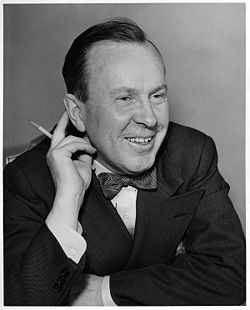
Diplomat and politician Lester Pearson won the title more than any other person except Pierre Trudeau.
-
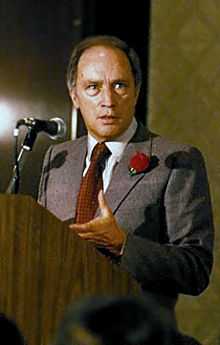
Pierre Trudeau in 1980 was newsmaker multiple times.
-
Terry Fox in Toronto during his Marathon of Hope cross-country run (July 1980).
-
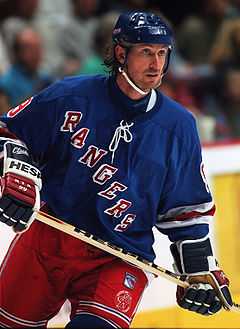
Wayne Gretzky was the newsmaker for 1982.
-
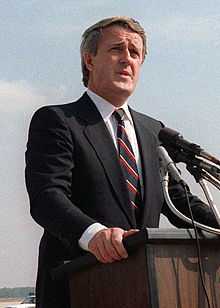
Prime Minister Brian Mulroney was the newsmaker for 1983, 1984, and 1991.
-
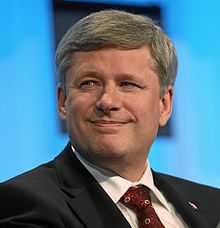
Prime Minister Stephen Harper was the newsmaker for 2008, and 2009.
-
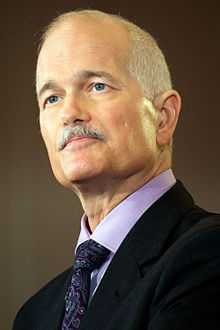
Leader of the Opposition Jack Layton was the newsmaker for 2011.
See also
- Canada: A People's History
- Heritage Minutes
- List of inductees of Canada's Walk of Fame
- Persons of National Historic Significance
- The Greatest Canadian
Notes
- ↑ Pierre Trudeau holds the record for most wins, receiving the distinction for the 10th time in 2000, breaking a tie with Lester B. Pearson's nine wins.[3]
References
| Wikimedia Commons has media related to Canadian Newsmaker of the Year. |
- ↑ 1.0 1.1 1.2 "Poll to select century's events". Moose Jaw Times Herald. 27 September 1999. p. 7.
- ↑ "Most CP survey winners politicians". Trail Times. 30 December 2002. p. 8.
- ↑ 3.0 3.1 Canadian Press (31 December 2002). "Canadian Press names Chrétien newsmaker of 2002". CTV. Retrieved 20 February 2007.
- ↑ 4.0 4.1 "A worthy winner". Expositor. 28 December 2001. pp. A.8.
- ↑ 5.0 5.1 White, Scott (6 December 1999). "Trudeau named Canadian newsmaker of the century". Canadian Press.
- ↑ "Chrétien top newsmaker of 1998". CBC. 27 December 1998. Retrieved 18 April 2009.
- ↑ Graveland, Bill (25 December 2006). "Canadian Soldier chosen as Newsmaker of 2006". National Post. Retrieved 2 January 2007.
- ↑ Brown, Jim (26 December 2007). "RCMP picked as CP's newsmaker of 2007". Canadian Press.
- ↑ "Harper selected as Canada's newsmaker of the year". CTV. 23 December 2008. Retrieved 23 December 2008.
- ↑ Levitz, Stephanie (22 December 2011). "Jack Layton named 2011's Newsmaker of the Year". The Globe and Mail. Retrieved 22 December 2011.
- ↑ Blatchford, Andy (22 December 2012). "Magnotta surfaces again: this time as Canadian Press News Story of the Year". The Canadian Press. Retrieved 29 December 2012.
- ↑ "Rob Ford is Canada's Newsmaker of the Year". CBC News. 22 December 2013. Retrieved 22 December 2013.
- ↑ Perkel, Colin (December 20, 2014). "Slain soldiers Cirillo and Vincent named Canada's Newsmaker of the Year". The Canadian Press. Retrieved December 20, 2014.
| ||||||||||||||||||||||||||||||||||||||||||||||||||||||||||||||||||||||||||||||||||||||||||||||
